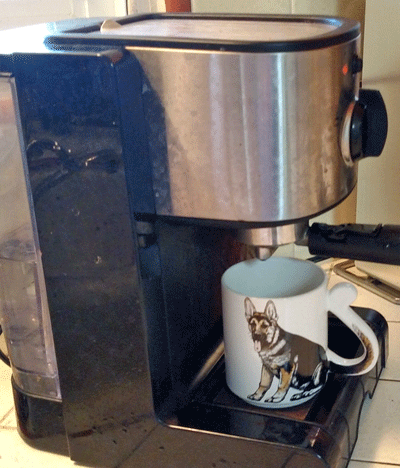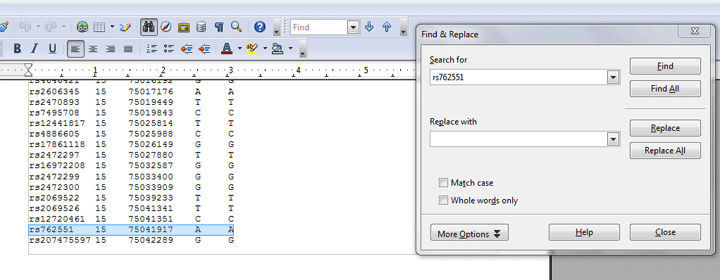Whenever a new study is published linking a specific gene or SNP to a particular trait or health risk I go rushing to my DNA results to see what I have, so I thought I would share how I do that.
My latest worry is my coffee drinking habit.
 There are so many coffee and caffeine studies that I am totally confused about what I should be doing. One caveat is that most of these studies are far from comprehensive and all of them need to be taken with a grain of salt. Have they really factored out all the other possibilities that could cause this result? Let’s face it, it’s early days yet in understanding what specific genetic variants do.
There are so many coffee and caffeine studies that I am totally confused about what I should be doing. One caveat is that most of these studies are far from comprehensive and all of them need to be taken with a grain of salt. Have they really factored out all the other possibilities that could cause this result? Let’s face it, it’s early days yet in understanding what specific genetic variants do.
Personally when I read one of these articles, the first thing I do is google that gene name to find the associated SNP’s “rs” number so that I can find that variant in my results. For example let’s look at rs762551, a SNP involved in the metabolizing of coffee.
While it is easy to look up a gene or SNP if you have tested at 23andMe or GENOS by using their browse raw data functions, what if you have only tested at Ancestry.com? Or Family Tree DNA, which has deliberately chosen not to test health related SNPs?
It’s actually pretty easy to look up a SNP in your raw data if you have downloaded it.
Looking up a SNP in your Ancestry data
First of all, if you have not yet downloaded your Ancestry.com DNA data, you need to do so. Click here for a youtube video. Or try this link https://stonefamilytree.wordpress.com/2014/08/03/how-to-download-your-ancestry-dna-test-results/ to see how to do that.
Next unzip the downloaded raw DNA data and open the resulting text file in your word processor or notepad. It will not open instantly because it is a big file, so patience is advised. Once it is open, search for the “rs” number but be careful to get the correct one as there may be a similar one with more digits. For example when I searched for rs762551, I found rs7625517 first, so had to search again. Look below at a cousin of mine’s result: the two letters on the far right are her variant, so for example “A A” in this case.
Looking up a SNP in Family Tree DNA data
Click here for the Family Tree DNA download instructions (use build 37), then you will need a program to extract from a Gzip file. They have links on that page for those. Personally I use 7zip.
The extracted raw data file is a CSV so you open it in Excel or whatever spreadsheet program you use. Then use the search function and no surprise, rs762551 is not tested by them.
How to find an RS number
How did I find this RS number? Googling of course. I tried looking for “coffee gene” and found this article https://news.northwestern.edu/stories/2016/10/java-gene-study-links-caffeine-metabolism-to-coffee-consumption-behavior/
Actually I used the search phrase “site:edu coffee gene” in order to get edu domains only, thus finding the more trustworthy sites, the ones unlikely to have reports blown out of proportion (fake news?).
And finally the coffee genetics
Eventually I found an article from the non-profit group Health Watch in Great Britain which explained the latest research in a way I could understand. It mentioned four specific SNPs: http://www.gbhealthwatch.com/Trait-Caffeine-Consumption.php
This article said that if you have an AA (or TT which is the same thing just reported differently) at rs762551, you are a fast coffee metabolizer and can drink many cups of coffee without endangering your heart. Sadly l am not fast, which I suspected since, as I have gotten older, I can no longer drink any coffee after about 11:30 a.m. without it keeping me up too late. Note that my cousin, whose ancestry data is shown above, can keep drinking her coffee! Norwegians love their joe…
Last year’s study, mentioned in my google feed from a Seattle paper the other day, suggests that more than a cup a day may put me at a higher risk for heart disease, sigh. We switched to half caf long ago to get the benefits of the anti-oxidants without the caffeine, so I guess I can drink 2 cups of that a day. Other studies suggest that 3 cups a day can be protective against dementia and Alzheimer’s but do not mention if the decaf is as effective. So what to do? Weigh one risk against the other I guess. Plenty of heart disease in my family’s older members but no dementia until the mid 90s (and that only AFTER the heart disease).
Decaf after my two half caf cups is therefore my new choice.

I just did a search through my Ancestry DNA and I don’t have rs762551. I do have the rs7625517 that you mentioned but not the rs762551.
Since you already said that this isn’t in the FTDNA data I opened my 23andMe raw data file. I found it there 🙂 I am an AC. This is interesting information because I have been drinking two 6 oz cups of decaf every day specifically to protect my heart. I have high cholesterol but I have been able to keep it in check VERY nicely with dietary changes with the added 12 oz of decaf as part of the regimen.
I guess that means I need to do a little studying. Thanks for this great article.
You are welcome. My cousin is tested on the new chip at Ancestry so perhaps the old chip does not test this SNP.
The Gb health watch site has a number of other good plain English articles about genetic risks including one about chloresterol …
Hei
I too cannot drink coffee in the afternoon, I drink very thin Nescafe in the morning. If I drink ordinary coffee I cannot sleep at all in the nihts.
So my dear cousin, we share this as well as our teeth! So good to hear from you.
Be careful with decaf, as it still contain some caffeine. I can drink caffeinated coffee in large quantities but my wife is time limited. She stops her 7/8 decaf at 5:15 pm sharp or her sleep is interrupted at 11:30 pm. Those genes are working.
I remember that once the NY times did an article where they spot checked decaf at places around the city and the caffeine content ranged from 2-5% on decaf!
So yes I am time limited on decaf as well. I have long since given up my after dinner cup of decsf
I dunno about coffee hazards in ones genes but I read that genes can affect your like or dislike of that morning cup. I can’t stand the smell of it! After I married my husband and would make his coffee I’d often feel green as it brewed! I finally got used to it and the olfactory assaults finally abated. I’m a chai tea latte in the morning sort of girl!
I’m an AC at that SNP, and I drink 4 cups of coffee (full caff, of course, lol), and have since I was 12. (I’m now in my mid 50’s). I can drink coffee at 11 pm, and still fall asleep at 12:30 a.m so I’ve made the decision not to worry about it. As you well know, there is so much that science doesn’t know yet… meanwhile, I will enjoy my cup of joe. (Factoring in my decision, though, that heart disease is not front and center in my family’s medical history.)
Sounds like a fine decision Cathy. A number of other ACs have the same experience as you so I suspect just one variant is good enough, probably combined with a few other coffee helpful SNPs
Sadly I am a CC …
Kitty – Do you have an automatic search or something like that that flags the SNP relationship to body function? If not, how did you find the caffeine related article?
David –
I have a google news alert for genetics. When an article of interest comes up, I try looking at the original study to find the gene and SNP details. Else look at the methodology I use under the subtitle “How to find an RS number” above
Of course now that I have found that terrific GB health watch site I will look there first. I am currently working my way through all of their relevant articles, like blood lipids …
Hey, cuz!
I did not like coffee til I worked at bakery after school and Saturdays. It was free, but sodas to go with the baked goodies on breaks, was a whole nickel. Next job was proof reader at law book publishing, and some things we had to read aloud to copyholder or copyholder listening, was sleep provoking especially after lunch. My co worker used to bring huge mug of coffe that she shuddered after each swallow, because “my dear, to keep me awake” and then was furious when I told her my Mom and I would drink a pot full and be asleep in less than 30 seconds.
Thanks for the info
You “TT”s are sooo mean!
Hi Kitty
I came across this post after viewing my raw AncestryDna data to check my own result at rs762551, being puzzled to see this as “TT” rather than some combination of A/C. I note your reference to “TT being equivalent to AA” (which I’m delighted to read as it gives me the faster version of the gene). However I’m curious as to how this can be as I understand “A = Adenine, but T = Thymine”. Isn’t this a bit like saying Oxygen = Nitrogen?
Would be grateful for any clarification you can give. Many thanks in anticipation!
These test results just list one part of the base pair. see https://ghr.nlm.nih.gov/primer/basics/dna
“DNA bases pair up with each other, A with T and C with G, to form units called base pairs. ”
So a TT is actually AT and AT as is an AA … in other words the results only list one member of the pair
I look at snpedia for the ‘rs’ numbers I might be interested in 🙂 https://www.snpedia.com/index.php/Category:Is_a_medical_condition
good tip, I use SNPedia also and its great, however that GB health watch site is plain (British) English which I really like
Great post.
There is certainly an age thing going on as well as the genetics, with many keen coffee drinkers having to give up their afternoon cup as they age.
My test is with FTDNA, so I can’t check the rs location from that, but I think I know enough that I am somewhere in-between: love coffee, but can’t have too much.
For a while, a couple of years back, there were some places offering an extract from green (unroasted) beans. Antioxidants will tend to be destroyed to some degree in the roasting process, but the latter produces the lovely flavours we enjoy. Don’t think the green beans were easy for baristas to grind and extract and it disappeared fairly quickly. Certainly before it made its way to my neighbourhood!